- What is Recruitment Marketing?
- Benefits of Recruitment Marketing
- The Recruitment Marketing Funnel
- Recruitment Marketing Content Calendar and Plan
- Recruitment Marketing Strategies & Tools
- Frequently Asked Questions (FAQs)
Recruitment Marketing: Definition, Importance, and Strategies
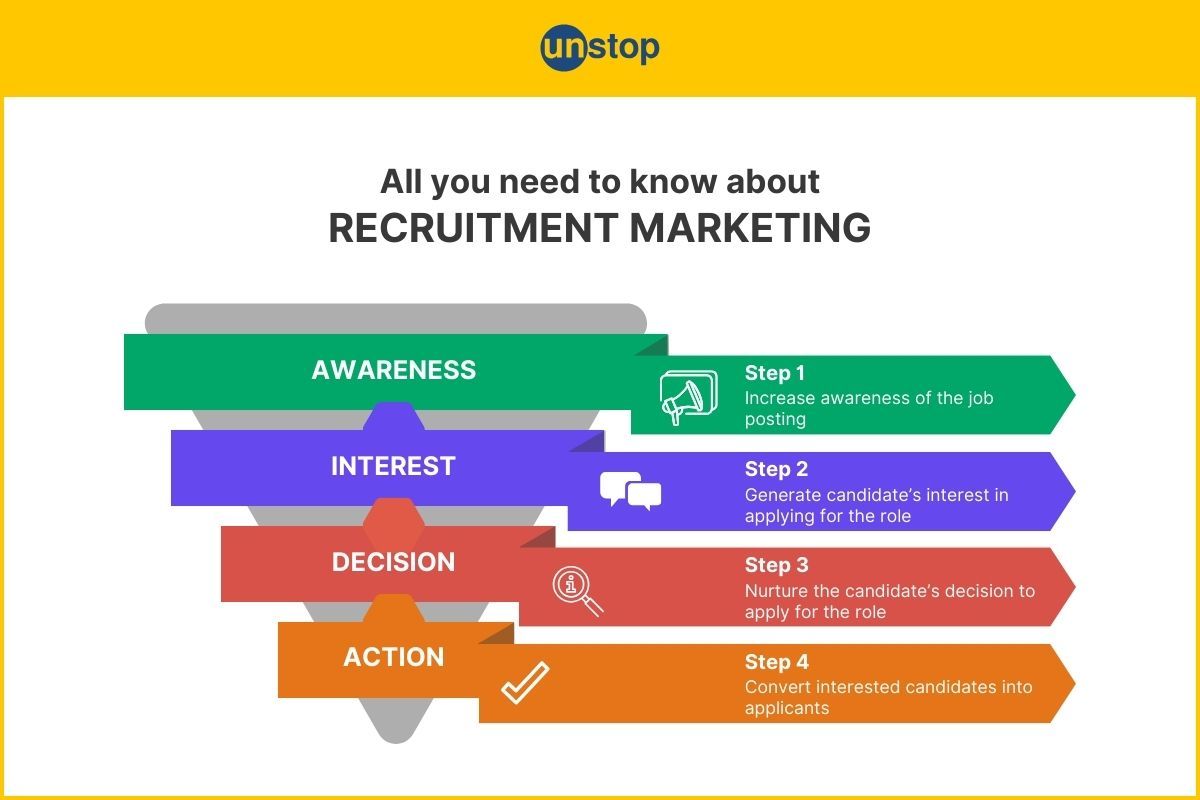
In the digital age, recruitment strategies have evolved to leverage various platforms and techniques to reach a wider pool of talented individuals. One such recruiting strategy is recruitment marketing.
What is Recruitment Marketing?
Recruitment marketing helps attract and engage prospective employees during the hiring process. But what exactly is recruitment marketing?
Definition: Recruitment marketing refers to the strategic use of marketing tactics and techniques to attract and engage potential candidates for job openings within an organization.
A successful recruitment marketing campaign involves creating compelling recruitment marketing content, utilizing targeted search and review activities, and aligning these efforts with overall business goals to not only enhance the employer brand but also attract top talent that aligns with the company culture and values.
The ultimate goal of recruitment marketing is to create a positive brand image of the employer - one that resonates with the target audience and encourages them to consider applying for job opportunities within the organization.
Recruiting vs Recruitment Marketing
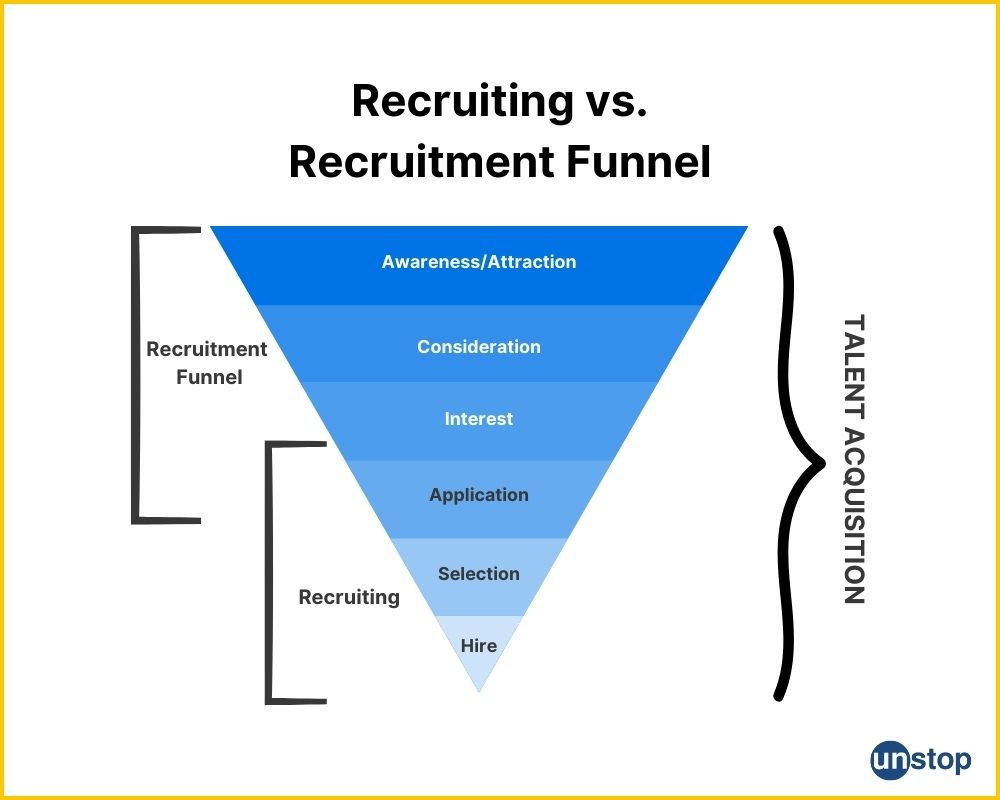
Recruiting and recruitment marketing are two distinct but interconnected concepts in the field of talent acquisition.
Recruiting refers to the overall process of hiring qualified candidates for open roles. It involves activities such as job posting, screening candidates, interviewing, and making job offers. The focus of recruiting is on finding the right individuals who possess the necessary skills, qualifications, and experience to meet the specific requirements of the job.
Recruitment marketing aims to attract and engage potential candidates by promoting the organization and showcasing it as an attractive place to work. It involves various marketing techniques and channels, such as social media, content marketing, employer branding, and targeted advertising.
Thus, while recruiting focuses on the actual process of hiring candidates, recruitment marketing plays a crucial role in attracting and engaging top talent, creating a pipeline of potential candidates, and building a strong employer brand.

Benefits of Recruitment Marketing
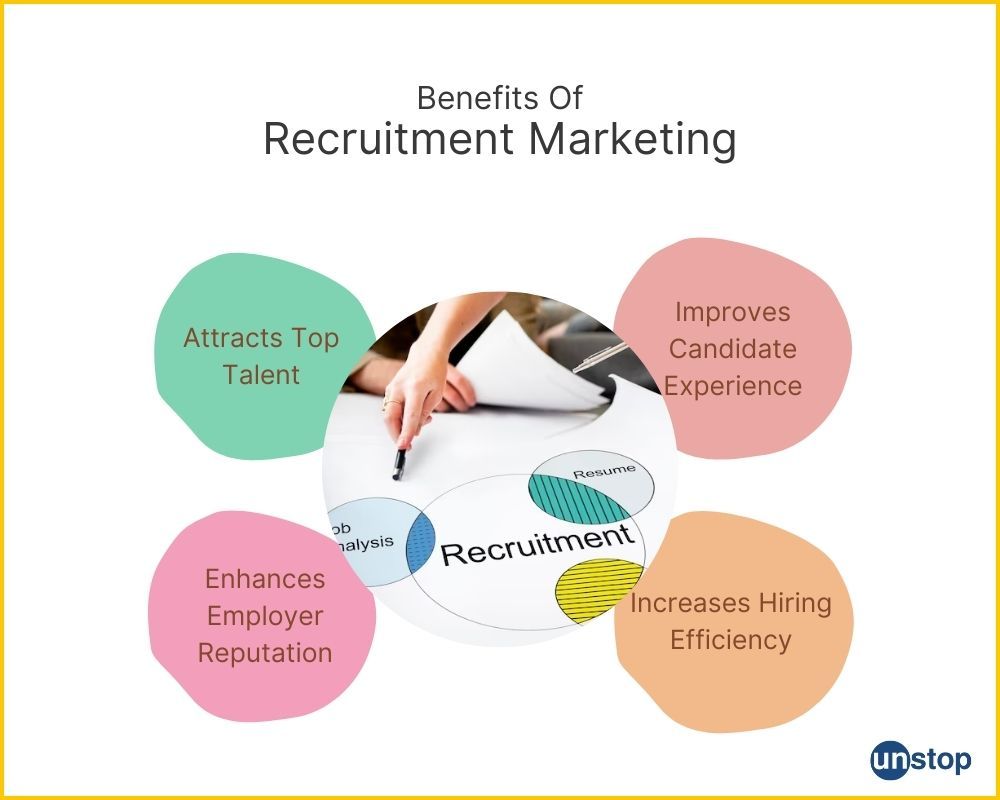
Here are the four key benefits of recruitment marketing:
Attracting Top Talent
Recruitment marketing plays a crucial role in attracting top talent by utilizing targeted messaging and branding strategies. By tailoring job advertisements and employer branding efforts to specific candidate demographics, companies can capture the attention of qualified individuals who align with their organizational values and requirements.
Improving Candidate Experience
A key benefit of recruitment marketing is its ability to enhance the overall candidate experience throughout the hiring process. By implementing personalized communication, timely updates, and streamlined application procedures, companies can create a positive impression on candidates. This improves engagement levels and fosters a sense of value for applicants, ultimately increasing the likelihood of attracting high-quality candidates.
Increasing Efficiency
Recruitment marketing also contributes to increased efficiency by reducing time-to-hire and cost-per-hire metrics. Targeted job advertisements ensure that vacancies reach relevant audiences quickly, resulting in higher-quality applications within shorter timeframes. Moreover, by leveraging digital platforms such as social media or online job boards, companies can reduce costs associated with traditional recruitment methods while reaching a wider pool of potential candidates.
Enhancing Employer Reputation
Employer reputation and brand image are critical factors in attracting talented individuals. Through recruitment marketing initiatives, companies can showcase their unique selling points, company culture, employee benefits, and career growth opportunities. This not only helps in establishing a strong employer brand but also positions the organization as an attractive workplace for potential candidates.
Recruitment Marketing vs Employer Branding
Recruitment marketing and employer branding may seem similar, but it's important to understand their differences to effectively leverage them for the organization's hiring needs.
Recruitment marketing is all about reaching out to candidates who are actively looking for employment opportunities. It involves creating targeted campaigns and utilizing various channels such as social media, job boards, and career fairs to engage with potential candidates. The main goal of recruitment marketing is to attract qualified individuals actively seeking job opportunities.
Employer branding goes beyond just attracting candidates actively seeking jobs. It focuses on building a strong reputation for your organization as an employer of choice. Employer branding encompasses your company culture, values, employee experiences, and overall perception in the job market. It aims to create a positive image that attracts not only active job seekers, but also passive candidates, i.e. individuals who are not actively looking for employment opportunities.
While recruitment marketing and employer branding have distinct focuses, they work hand in hand to create a comprehensive talent acquisition approach. By combining both strategies effectively, you can attract both active and passive candidates while showcasing your organization's unique culture and values.
Recruitment marketing plays a integral role in supporting employer branding efforts by amplifying the brand message to potential candidates.
The Recruitment Marketing Funnel
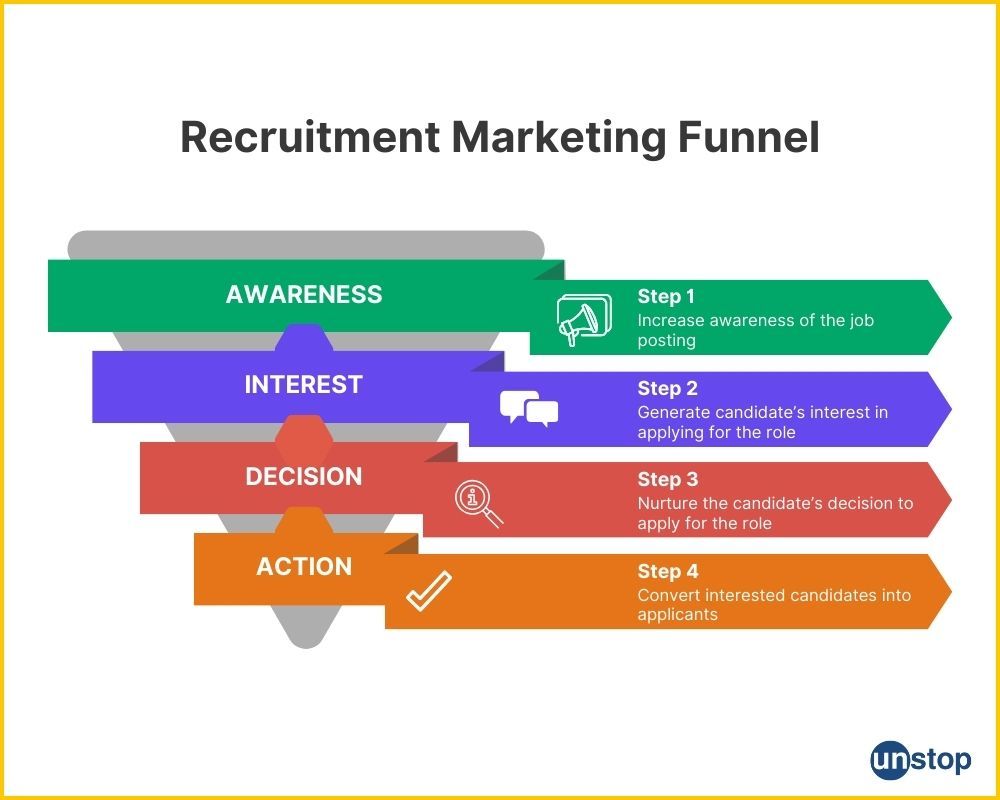
The recruitment marketing funnel consists of four main steps: Awareness, Interest, Decision, and Action. Together, they help convert candidates into applicants. Let’s study each step in detail:
-
Awareness: This is the first stage of the recruitment marketing funnel, where the goal is to create awareness about the company and its job opportunities through various marketing channels, to reach a wide audience. For example, a company may run targeted social media ads to promote their open positions or participate in job fairs to increase brand visibility. The key is to generate interest and attract potential candidates to the next stage.
-
Interest: In this stage, the goal is to capture the interest of potential candidates and encourage them to learn more about the company and the job opportunities available. This can be done through content marketing that highlights the company culture, benefits, and career growth opportunities. For instance, a company may create a video showcasing its workplace environment and employee experiences to engage candidates and pique their interest.
-
Decision: Once candidates have shown interest, the next step is to help them make a decision to apply for a specific job. This stage involves providing them with the necessary information and resources to evaluate their fit for the role and the company. For example, companies can create detailed job descriptions, including required qualifications, responsibilities, and benefits, to help candidates assess their suitability. Additionally, providing a seamless application process and offering personalized communication can further encourage candidates to move forward.
-
Action: The final stage of the recruitment marketing funnel is to convert interested candidates into applicants. This involves guiding them through the application process and making it as simple and user-friendly as possible. Companies can leverage technology, such as applicant tracking systems, to streamline the application process.
Recruitment Marketing Content Calendar and Plan
To effectively execute recruitment marketing, it is crucial to have a well-structured content calendar and plan. This will help you stay organized, ensure timely content creation, and tailor your messaging to resonate with your target audience. Here are some key steps to follow:
Mapping out Key Dates and Events
Identify important dates, events, or seasons that are relevant to your industry. These could include job fairs, conferences, or even specific times of the year when hiring tends to increase. By mapping out these key dates in your content calendar, you can create content that aligns with these events and maximizes its impact.
Identifying Target Audience Personas
Knowing your target audience enables the creation of engaging recruitment marketing content. Develop detailed personas that represent different segments of your ideal candidates. Consider factors such as their demographics, interests, motivations, and pain points. Tailor your content accordingly to address their specific needs and preferences.
Remember, your target audience is different from the target market. Find out more here.
Planning Diverse Content Formats
Recruitment marketing should encompass a variety of content formats to capture the attention of different individuals. Plan for diverse formats such as blog posts, videos, infographics, social media posts, webinars, or podcasts. This allows you to reach candidates through various channels and cater to their preferred ways of consuming information.
Establishing Clear Goals
Each piece of recruitment marketing content should have clear goals in mind. Determine what you want to achieve with each piece - whether it's increasing brand awareness among potential candidates or driving more applications for specific job openings. To measure the effectiveness of your efforts, set measurable goals.
By following these steps and implementing a well-structured recruitment marketing content calendar and plan, you can streamline your efforts and ensure consistent messaging across all platforms.
Recruitment Marketing Strategies & Tools
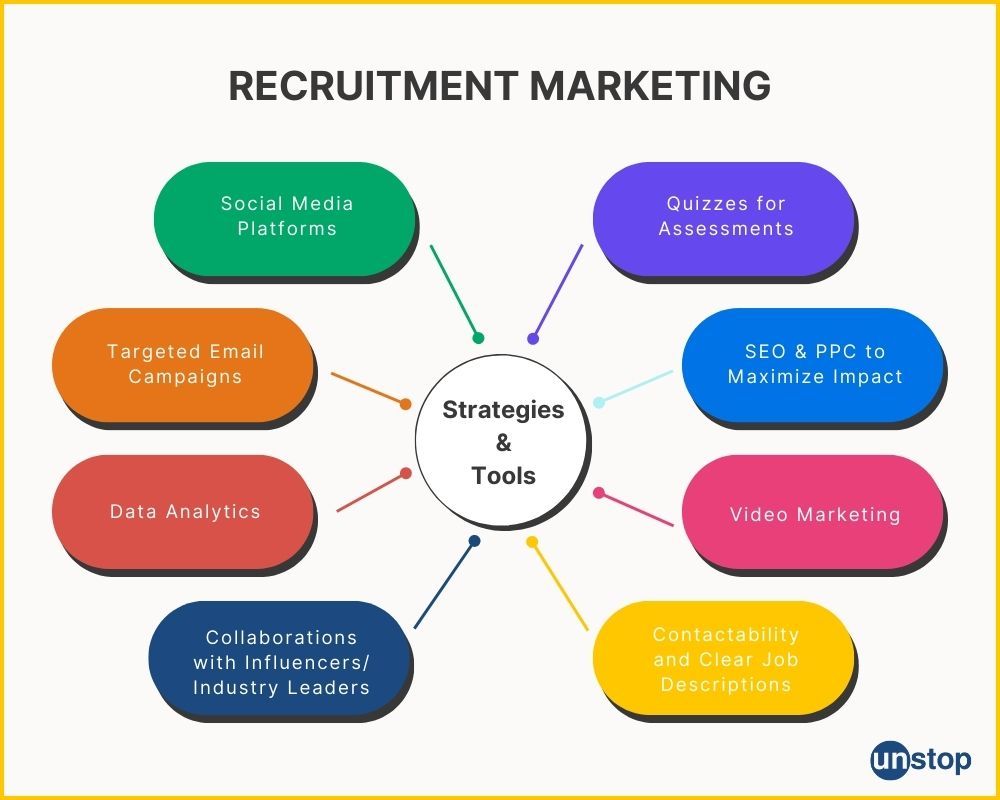
Here are some strategies that employers can adopt for effective recruitment marketing:
Utilizing social media platforms
By leveraging social media platforms (Instagram, Facebook, and Twitter) companies can showcase their employer brand and engage with job seekers. Posting job openings, sharing company culture content, and actively participating in industry-related discussions help create awareness and attract top talent.
Implementing targeted email campaigns
Engaging passive job seekers is crucial in recruitment marketing. Targeted email campaigns also allow companies to reach out to passive candidates. By crafting personalized messages that highlight the benefits of working for the organization, companies can pique the interest of passive candidates and encourage them to consider applying.
Leveraging data analytics
Data analytics includes tracking key metrics. Metrics such as conversion rates, applicant sources, click-through rates, etc. help gain valuable insights into which marketing efforts are yielding the best results. This data-driven approach enables organizations to optimize their strategies by focusing on channels that generate high-quality candidates.
Collaborating with industry influencers or thought leaders
Partnering with industry influencers or thought leaders can significantly expand a company's reach in recruitment marketing. These individuals have established credibility and a large following within specific industries or professions. By collaborating with them on content creation or hosting joint events, companies can tap into their networks and attract qualified candidates who trust their recommendations.
Designing Quizzes for Assessments
Designing quizzes can help assess candidates' skills and cultural fit within your organization. Quizzes provide an engaging way for applicants to showcase their abilities and demonstrate why they would be a valuable addition to your company.
It's important to ensure that the questions are relevant and aligned with the skills required for the role. By designing skill-specific quizzes, you can attract individuals who possess the desired expertise and stand out from other companies vying for their attention.
Personalizing quiz results is crucial in providing tailored feedback or recommendations to candidates based on their performance. This not only helps them understand their strengths and areas for improvement but also showcases your organization's commitment to individual growth and development.
Looking for accurate, novel and affordable assessment tools? Explore Unstop’s online assessment platform for solutions.
Video Marketing to Engage Candidates
Video marketing is an innovative way to attract and engage job candidates, by showcasing the company's culture, values, and work environment. Here are two ways to use video marketing to attract top talent:
Showcase the workplace and culture: Recruitment videos allow companies to provide a visual representation of their workplace that can resonate with prospective candidates. These videos can highlight the unique aspects of the company, such as its mission, team dynamics, and employee benefits. By showcasing an engaging and positive work environment, companies can attract qualified candidates who align with their values and goals.
Share employee testimonials and success stories: This approach provides potential applicants with firsthand insights into the company's employee value proposition (EVP) and highlights the achievements of current employees. By showcasing these stories through videos, companies can build trust and credibility among job seekers.
Enhancing Contactability and Writing Clear Job Descriptions
To attract the right candidates, employers must make it easy for job searchers to get in touch and communicate what they're looking for in a role.
To enhance contactability, make sure that your contact information is readily available on your careers page, job postings, or any other platforms where you advertise open positions. This includes providing an email address or a phone number that potential applicants can use to reach out with inquiries or submit their applications.
Job descriptions should be concise and SEO-driven, highlighting the key responsibilities and qualifications required for the position. Use bullet points or short paragraphs to break down the information and make it easier for candidates to scan through. To streamline the application process, include specific instructions on how candidates should apply or inquire about the position. For example, you can ask them to submit their resumes via email or fill out an online form on your website. By providing clear directions, you'll ensure that applicants know exactly how to take the next steps.
Maximizing Recruitment Marketing with SEO & PPC
Implementing search engine optimization (SEO) strategies can significantly enhance the visibility of job postings on search engine results pages. By incorporating relevant keywords throughout website content and landing pages, companies can improve their organic ranking and attract more qualified candidates. SEO should also drive other recruitment marketing strategies, like video marketing.
Utilizing pay-per-click (PPC) advertising campaigns is another effective way to target specific keywords or demographics. With PPC, companies can create targeted ads that appear at the top of search results, increasing the chances of attracting potential candidates who are actively searching for job opportunities.
In conclusion, embracing recruitment marketing can be a game-changer for organizations seeking to attract top talent. By understanding its importance, implementing effective strategies, and maximizing its potential through SEO and PPC campaigns, companies can significantly improve their hiring outcomes. So why wait? Start harnessing the power of recruitment marketing today to elevate your organization's success in finding exceptional talent.
Frequently Asked Questions (FAQs)
1. How long does it take to see results from recruitment marketing?
Recruitment marketing results may vary depending on several factors such as industry competitiveness, target audience demographics, and the effectiveness of your strategies. It’s a long-term investment. Building brand awareness, establishing relationships with potential candidates, and generating quality leads takes time but yields sustainable outcomes in the long run.
2. Can small businesses benefit from recruitment marketing?
Absolutely! Recruitment marketing is not limited to large corporations. Small businesses can implement recruitment marketing strategies to attract top talent that aligns with their values and goals by showcasing their unique company culture, offering growth opportunities, and highlighting the advantages of working in a smaller organization.
3. How can video marketing enhance candidate engagement?
Through videos, you can showcase your workplace environment, introduce team members, share success stories, and provide insights into your company's mission and values. This visual medium helps candidates develop a deeper connection with your organization and gain a better understanding of what it would be like to work there.
4. Is it necessary to use SEO and PPC for recruitment marketing?
While not mandatory, utilizing search engine optimization (SEO) techniques and pay-per-click (PPC) advertising can significantly enhance the effectiveness of your recruitment marketing efforts. SEO helps improve the visibility of your job postings on search engines, making them more accessible to potential candidates. PPC campaigns allow you to target specific keywords or demographics, ensuring that your job opportunities reach the right audience at the right time.
5. Are there any legal considerations in recruitment marketing?
Yes, organizations must adhere to legal guidelines when conducting recruitment marketing activities.
You may also be interested in the following:
- Role Of Soft Skills In Modern Hiring Can't Be Ignored. Here's Why
- Understanding Recruitment Funnel Metrics: The Perfect Approach To Measuring Effectiveness Of Hiring
- Hiring Trends In IT Industry In 2023: New Tech Hubs, Contract Work & More
- How To Hire Programmers: 4 Easy Steps To Find The Right Talent In 2023
- AI in Hiring: The Ultimate Guide for HR Professionals
I’m a reader first and a writer second, constantly diving into the world of content. If I’m not writing or reading, I like watching movies and dreaming of a life by the beach.
Login to continue reading
And access exclusive content, personalized recommendations, and career-boosting opportunities.
Subscribe
to our newsletter
Blogs you need to hog!
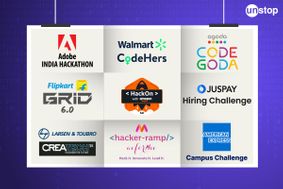
Organize Hackathons: The Ultimate Playbook With Past Case Studies

What is Campus Recruitment? How To Tap The Untapped Talent?
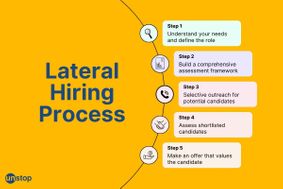
Lateral Hiring: A Complete Guide To The Process, Its Benefits, Challenges & Best Practices
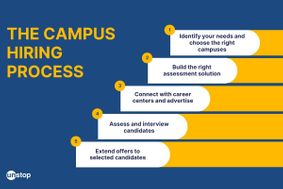








Comments
Add comment